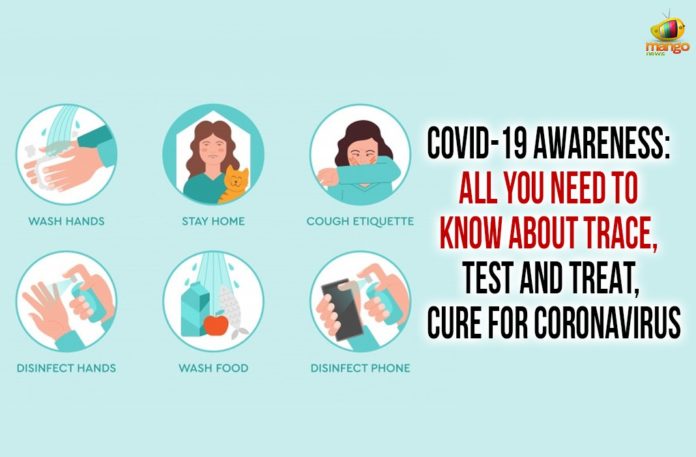The new initiative of the World Health Organization (WHO,) T3 is the only measure to control the spread of the Novel Coronavirus or COVID-19.
The three Ts are: Trace, Test and Treat. The Union Government adopted the T3 initiative as a precaution to control the deadly virus from spreading.
How T3 Would Work?
Since there is no cure and vaccine of the Novel Coronavirus infection, tracing the suspected cases, conducting a COVID-19 test and if positive, treating the patients is the only cure of the deadly infection.
Compared to other pandemic illnesses like Ebola and H1N1, the Novel Coronavirus is less lethal, the mortality rate of this disease is 2% to 3%.
However, this virus is lethal in transmission, since the WHO admitted it to be an airborne disease, the lethality of the transmission increases even more.
Unlike Ebola and H1N1, the Coronavirus could infect people with just sneeze, cough and even touch.
Therefore, state governments are focusing on increasing the COVID-19 test capacity, tracing people infected and then treating them with proper medication.
How to know if one needs to be tested for COVID-19?
If you don’t feel well, you may assume if you have COVID-19. Some of the basic symptoms of the Novel Coronavirus is fever, cough, cold, sore throat, chill, respiratory issues, breathing problems and body aches. If any of the above mentioned symptoms lasts for a week without any improvement, you should take medical help and undergo a COVID-19 test.
Who Should Get Tested?
Talk to your doctor about whether you need to get tested. If you don’t have a doctor, call your local hospital or health department.
The Centres for Disease Control CDC recommends a priority system for who should get tested. At the top of the list are people who have COVID-19 symptoms and who meet at least one of these criteria:
Are admitted to the hospital
Work in a healthcare facility
Are first responders
Work or live in places where many people live, such as long-term care facilities or prisons
The next priority level is:
Other people who have symptoms of COVID-19.
How to Get Tested?
In regard to this question, how one should get tested for the Novel Coronavirus, one should call their doctor, local hospital or helpline numbers of the State Health department.
In case of emergency, just call to helpline number launched by the Union Government, +91 1123978046.
Whoever you call, you would be asked a few basic questions, based on which you might be asked to get a COVID-19 test.
They may ask you some of these questions:
Do you have a fever or cough?
Do you have shortness of breath?
Have you been in close contact (within 6 feet) with someone who has COVID-19?
Has someone with COVID-19 coughed or sneezed on you?
Have you traveled recently?
Did a health official tell you that you’ve come into contact with COVID-19?
When to be admitted to COVID-19 hospital?
So if you test positive for the virus and your symptoms are mild, your doctor will probably tell you to recover at home and stay away from others, which is self isolation. However, if your condition needs proper medical attention, you might be asked to admit to a COVID-19 designated hospital.
Where to get tested for COVID-19?
Your doctor or another health care professional will tell you where to go for the test. They’ll also give you some special instructions. Those might include wearing a mask or going to a certain part of the hospital or clinic.
In every state and city, there are clinics and diagnostic centres or laboratories approved by the Indian Council of Medical Research (ICMR) to conduct the COVID-19 infection test.
Some of the helpline numbers of different states are:
Andhra Pradesh – 0866-2410978
Arunachal Pradesh – 9436055743
Assam – 6913347770
Bihar -104
Chhattisgarh – 077122-35091
Goa – 104
Gujarat – 104
Haryana – 8558893911
Himachal Pradesh – 104
Jharkhand – 104
Karnataka – 104
Kerala – 0471-2552056
Madhya Pradesh – 0755-2527177
Maharashtra – 020-26127394
Manipur – 03852411668
Meghalaya – 108
Mizoram – 102
Nagaland – 7005539653
Odisha – 9439994859
Punjab – 104
Rajasthan – 0141-2225624
Sikkim – 104
Tamil Nadu – 044-29510500
Telangana – 104
Tripura – 0381-2315879
Uttarakhand – 104
Uttar Pradesh – 18001805145
West Bengal – 03323412600
Types of Coronavirus Testing
The CDC recommends a COVID-19 test called a nasopharyngeal swab. The technician will put a special 6-inch cotton swab up both sides of your nose and move it around for about 15 seconds. It won’t hurt, but it might be uncomfortable. They’ll send the swab to a lab to test the material from inside your nose.
Other COVID-19 tests include swabs of:
Your mouth and throat (oropharyngeal)
The middle of your nostrils (nasal mid-turbinate)
The front of your nostrils (anterior nares)
If you have a cough with mucus, called a “wet” or “productive” cough, your doctor might want to test some of what you can cough up.
In another such testing, agencies and laboratories came up with Drive-through coronavirus testing. Some hospitals and agencies have set up centers where you can get a COVID-19 test without getting out of your car. All you need to do is to register online or by phone, as per rules of the particular laboratory. However, you would need a prescription before registering yourself for the COVID-19 test.
How Long Do Test Results Take?
It may take a lab about 24 hours to run your test. But you might not get your results for several days, depending upon the labs.
What to do, after being tested for COVID-19?
A positive COVID-19 test means you currently have or recently had the virus. Monitor your symptoms and get medical help right away if you have trouble breathing, confusion, or bluish lips or face.
Steps to avoid spreading the virus?
Stay home, except to get medical care.
Stay away from other people in your home.
Don’t share dishes, cups, eating utensils, or linens with others.
Cover your coughs and sneezes. Wash your hands often. Clean and disinfect common surfaces like phones, doorknobs, or counters regularly.
If your COVID-19 test is negative, you are not infected by the virus, but need to stay safe and follow COVID-19 guidelines to prevent being infected in future.
Follow the social vaccine, wash your hands every 30 minutes, wear face mask, social distancing (6 feet) and use sanitizer.
Staying safe and healthy during this pandemic crisis of the Novel Coronavirus is the only way to save yourself and others from being infected.
Meanwhile, globally the positive cases of the Novel Coronavirus are 14,071,933 and deaths at 595,171.
Stay tuned for further updates.


































